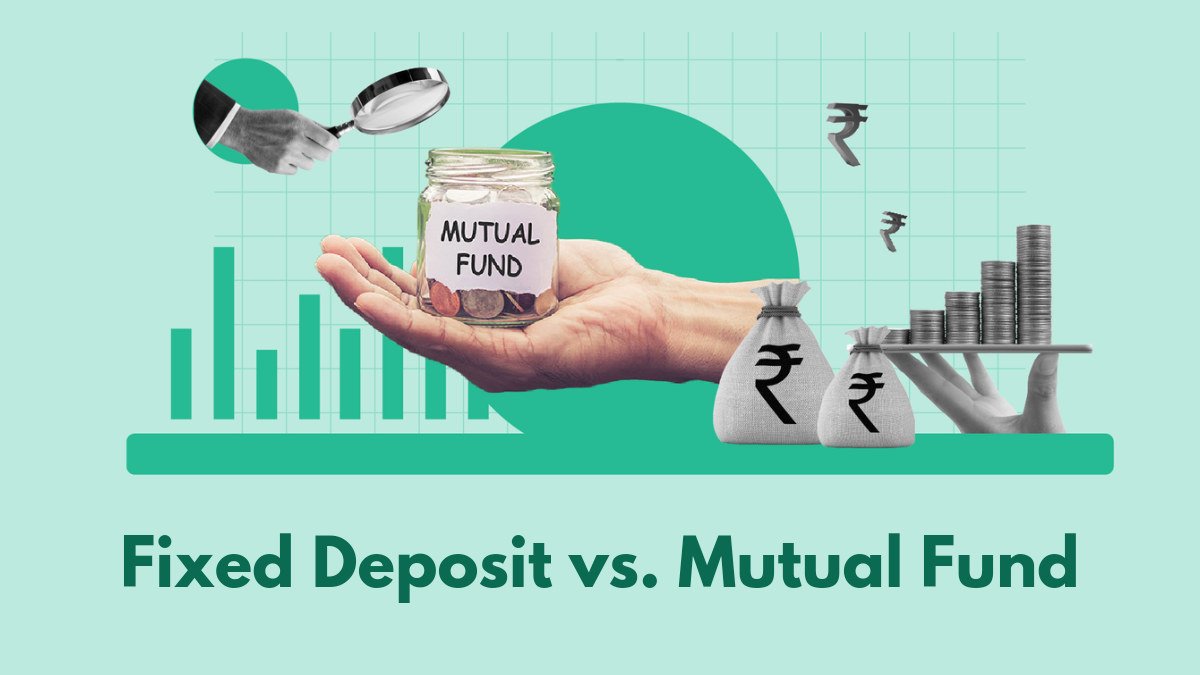Are you in India and wondering if you should put your money into a fixed deposit (FD) or mutual funds? The choice depends on your financial goals, how much risk you can handle, and how long you plan to invest. Let’s look into which option suits your needs and helps you feel financially secure.
Imagine you’ve been saving hard and now you’re deciding where to put your money. This choice shows what matters to you, how much risk you’re okay with, and what you hope to achieve in the future.
Fixed deposits give you the comfort of knowing your money is safe and will earn a fixed return. Mutual funds, on the other hand, could grow your money more, but they come with the risk of the market.
Think about what you want from your investment. Do you want a safe place for your money, regular income, or to grow your wealth over time? Your comfort with risk and how long you can invest will guide you. Knowing these things will help you choose wisely, matching your financial dreams.
Understanding Fixed Deposits and Mutual Funds
Fixed deposits (FDs) and mutual funds are two key investment options. FDs are a traditional choice for many in India. They offer a fixed interest rate for a set time, from 7 days to 10 years. The interest is added to the principal, giving a guaranteed return.
Mutual funds pool money from investors and are managed by companies. They invest in stocks, bonds, and other market-linked assets. The goal is to make money or income, based on the fund’s aim.

FDs give sure returns, but mutual funds can offer more in the long run, with some risk. Mutual funds come in different types, like equity for growth and debt for income. This variety helps investors spread their money across various assets. It can reduce risk and possibly increase returns.
Choosing between FDs and mutual funds depends on your investment goals and how much risk you can take. FDs are good for those wanting stable, predictable returns over short to medium terms. Mutual funds are for those aiming for higher growth over the long term, but they come with more market risk.
| Feature | Fixed Deposits | Mutual Funds |
|---|---|---|
| Risk Profile | Low Risk | Moderate to High Risk |
| Returns | Fixed, Guaranteed | Variable, Market-Linked |
| Liquidity | Limited (Withdrawal Penalties) | High (Ease of Redemption) |
| Diversification | Single Asset (Bank Deposit) | Diversified Portfolio |
Knowing the main points about fixed deposits and mutual funds helps investors pick the right one for their goals and risk level. This choice can help grow and stabilize their investment portfolio.
Fixed Deposit vs. Mutual Funds: Key Differences
When looking at fixed deposits (FDs) and mutual funds, there are key points to think about. FDs give you sure returns, with a fixed interest rate. This rate is guaranteed by the bank or financial institution. Mutual funds, though, have returns that can change with the market.
Mutual funds are very liquid, letting you cash out at any time. FDs can have penalties if you take out your money early. Mutual funds get a tax break, with lower tax on long-term gains and indexation for debt funds. FDs are taxed based on your income tax rate.
FDs are seen as a safer investment because of their guaranteed returns. Mutual funds carry risks tied to the market but can offer higher returns over time. Both options are watched over by regulators. FDs are under the Reserve Bank of India (RBI), and mutual funds are overseen by the Securities and Exchange Board of India (SEBI).
| Feature | Fixed Deposits (FDs) | Mutual Funds |
|---|---|---|
| Returns | Assured, fixed interest rate | Market-linked, can fluctuate |
| Liquidity | Lower, may have penalties for early withdrawal | Higher, can be redeemed at any time |
| Taxation | Taxed as per income tax slab | Long-term capital gains taxed at lower rate, indexation benefit for debt funds |
| Risk Profile | Lower risk, guaranteed returns | Higher risk, market-linked returns |
| Regulation | Governed by the Reserve Bank of India (RBI) | Supervised by the Securities and Exchange Board of India (SEBI) |
When choosing between fixed deposits and mutual funds, think about the risk, returns, liquidity, taxes, and rules. Look at your financial goals, how much risk you can handle, and your investment time frame. This will help you pick the best option for you.
Conclusion
Choosing between fixed deposits (FDs) and mutual funds depends on your financial goals, how much risk you can take, and how long you plan to invest. FDs are safe, making them great for those who want to keep their money secure or have short-term goals. But, if you’re looking for higher returns over time, mutual funds might be better, especially if you’re okay with some risk and have a long-term view.
Mutual funds also offer tax benefits and are easier to access your money compared to FDs. Mixing FDs and mutual funds can create a strong investment mix. This mix should match your financial situation and goals. Getting advice from a financial advisor can help you make a choice that suits you best.
Think about what you want from your investments, like keeping your money safe or growing it. Consider your financial goals, how much risk you can handle, and how you plan to spread your investments. By finding the right balance, you can improve your investment plan and reach your financial dreams.
